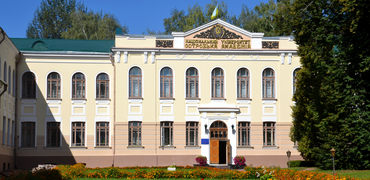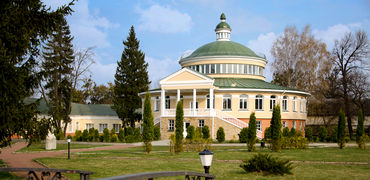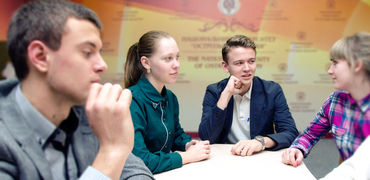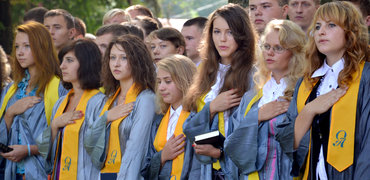WARN: Academic Response to Hybrid Threats

WARN: Academic Response to Hybrid Threats (610133-EPP-1-2019-1-FI-EPPKA2-CBHE-JP)
EU funding instrument: European Neighbourhood Instrument (Erasmus+: КА2 CBHE)
Duration: 15 November 2019 – 14 November 2022
Erasmus+ grant amount: 721 065,00 €
Website: https://warn-erasmus.eu/
Working group of the project
| Project Manager | Balashov Е.М. | Rector's Assistant for International Relations and Fundraising | |
|---|---|---|---|
| Project Finance Administrator | Matlasevych К.М. | Chief Accountant | |
| Project Working Team | Kryvytska О. R. | Head of the scientific department | |
| Lebediuk V. M. | Dean of the Faculty of Political Studies and Information Management | ||
| Romanov M. S. | Head of Political Science and National Security Department | ||
| Khudolii A. O. | Professor of English Philology Department | ||
| Zhovtenko T. H. | Associate Professor of Political Science and National Security Department | ||
| Malynovska N. V. | Senior Lecturer, Department of Political Science and National Security | ||
| Matsiievska S. A. | Methodist of Political Science and National Security Department | ||
| Nechyporuk M. V. | Head of Public Relations Department | ||
| Kulesha S. O. | Engineer of Information and Technical Center | ||
| Marchenko A. V. | Deputy Chief Accountant |
Consortium
| Grant holder: University of Jyväskylä, Finland | Coordinator and General Manager: Prof. Timo TIIHONEN, Vice-dean of Faculty of Information Technology
E-mail: timo.tiihonen@jyu.fi Web-site: https://www.jyu.fi/fi |
| Project coordinator in Ukraine: Kharkiv National University of Radio Electronics | Responsible person: Associate Prof. Svitlana Hryshko, Deputy Head of Economic Сybernetics and Management of Economic Security
E-mail: svitlala.gryshko@nure.ua Web-site: https://nure.ua/ |
| Partners of the project | |
| The National University of Ostroh Academy | Responsible person: Dr. Eduard Balashov, Rector's Assistant for International Relations and Fundraising
E-mail: eduard.balashov@oa.edu.ua Web-site: https://www.oa.edu.ua/ |
| Higher Educational Establishment Ukrainian Catholic University | Responsible person: Dr. Pavlo Khud, Vice-Dean of Faculty of Social Science
E-mail: mailto:pavlo.khud@ucu.edu.ua Web-site: https://ucu.edu.ua/ |
| State University of Infrastructure and Technologies | Responsible person: Prof. Yurii Dudnyk, Vice-Rector
E-mail: yu.dudnyk@gmail.com Web-site: http://duit.edu.ua/ |
| National Academy of Managerial Staff of Culture and Arts | Responsible person: Prof. Olha Kopiievska, Head of Department of Art Management and Event Technology
E-mail: okopievska@gmail.com Web-site: www.http://nakkkim.edu.ua |
| Kharkiv Regional Institute Of Public Administration Of The National Academy For Public Administration Under The President Of Ukraine | Responsible person: Prof. Dmytro Karamyshev, Deputy Director
E-mail: dvk1@i.ua Web-site: www.kbuapa.kharkov.ua |
| State Higher Education Institution “Donbas State Pedagogical University”, Horlivka Institute for Foreign Languages | Responsible person: Prof. Halyna Dokashenko, Head of the National and Foreign History Department
E-mail: galinadokashenko@ukr.net Web-site: www.ddpu.edu.ua |
| Ministry of Education and Science of Ukraine | Responsible person: Mrs. Liubov Shchitka, Deputy Head of International Cooperation and European Integration Department
E-mail: l_shchitka@mon.gov.ua Web-site: www.mon.gov.ua |
| ECAM-EPMI (Graduate School of Electrical Engineering) | Country: France
Web-site: http://www.ecam-epmi.fr/ |
| Universidade de Coimbra | Country: Portugal
Web-site: www.uc.pt |
| Tartu Ulikool | Country: Estonia
Web-site: www.ut.ee |
Project overview
WARN: Academic Response to Hybrid Threats (610133-EPP-1-2019-1-FI-EPPKA2-CBHE-JP)
EU funding instrument: European Neighbourhood Instrument (Erasmus+: КА2 CBHE)
Duration: 115 November 2019 – 14 November 2022
Erasmus+ grant amount: 721 065,00 €
Project description:
The new hybrid threats challenge the world, and Ukraine in particular, on every level:- new threats result to unknown and dangerous vulnerabilities of the societies- currently societies lack sufficient knowledge and skills to cope with new threats- present academic curricula do not even remotely prepare to complex hybrid threats.- Ukrainian state officials, regional administrations and ministries dealing with reality of hybrid war, are lacking the knowledge and skills to recognize, classify and counter hybrid threats with required efficiency. The analysis of Ukrainian curricula in fields of business and administration, information and communication technologies, social and behavioural science, arts, education, journalism and information showed that current curricula tend to be discipline based and do not address hybrid challenges adequately. The project aims to renew the above listed curricula by introducing unique content that builds awareness of hybrid threats and innovative gamified teaching methods that provide skills and competences to tackle complex threats proactively. The upgraded contents, based on newest EU partner curricula, together with new gamified teaching methods based on AI-inspired adversarial learning, will be used both in MSc degree education and in LLL to train “positive change agents” in diverse professional fields. The change agents will learn to adapt proactively to new complex, hybrid challenges, and to disseminate their knowledge to the society. International community of educators and alumnae (WARN network) will be created to guarantee the sustainable development of the educational content, teaching methods and dissemination after the project.The project will link to diverse stakeholders (ministries, state officials, local authorities, companies) for developing the content and to create real life scenarios as teaching materials for both degree education and LLL intensive courses, and for training them to counter hybrid threats.
Specific and wider objectives:
Project WAN targets the national security and the skill gap in security services created by the emergence of hybrid threats. Security sector alone does not have the skills and resources for countering complex hybrid threats but has to rely on security awareness of the critical fields in the society. Understanding the complex interdependencies and resulting vulnerabilities in key sectors is essential for improving the resilience of the nation and hence, the security and welfare of its citizens.
- To fill the security skills gap across various professional domains to increase civic resilience to hybrid threats in Ukraine;
- To adapt study programs in 7 fields of study and to create LLL course on Countering hybrid threats;
- To pilot the adapted study programs and LLL courses;
- To create a trans sectoral environment devoted to countering hybrid threats.
Expected project outcomes:
- To adapt 11 study programmes in 7 fields of study
- To deliver the adapted study programmes and courses
- To create a trans sectoral environment devoted to civic resilience to hybrid threats
Website: https://warn-erasmus.eu/ua/
NUOA commitments under the project
New courses will be implemented:
- Hybrid Threats and Comprehensive Security (National Security Educational and Professional Program);
- Hybrid Threats and Comprehensive Security (Political Science Educational and Professional Program);
- Public Discourse as a Component of Information Wars;
- Recognizing and Countering Hybrid Threats in Political Science.
Existing courses will be updated:
- Information and psychological operations;
- Information security of the state;
- State policy in the field of information security;
- National Security of Ukraine;
- Propaganda and counter-narrative;
- Modern political theory.
Tasks:
- Examine the experience and best practices of EU partners;
- Identify and analyze the requirements and needs to have new learning opportunities for stakeholders;
- Update master's programs in accordance with the requirements of the labor market, society;
- Develop new educational opportunities for a wide audience.
Expected tangible results:
- 2 modernized study programmes “National Security” and “Political Science”;
- 3 new syllabi;
- 6 updated syllabi;
- 3 on-line lecture courses based on new educational content;
- 9 new training materials for practical and laboratory on a new hybrid teaching methodology;
- 3 courses for distance learning;
- 3 courses oriented on professionals for LLL (in “National Security” and “Political Science” and "New hybrid teaching methodology");
- 3 courses oriented on professionals for LLL (in “National Security” and “Political Science” and "New hybrid teaching methodology");
- 1 updated educational labs;
- 1 launched hub of excellence;
- 60 full-time students in updated curricula (by the end of the project, for 2-times recruitment);
- 20 trainees in LLL courses (by the end of the project);
- 1 new hybrid teaching methodology;
- staff with EU projects experience;
- 1 Erasmus+ project implemented;
- partnership agreements with EU and UA HEIs;
- 12 faculty members certified by NUOA center of professional development for the program "New hybrid teaching methodology".
Impact of the results in the NUOA:
The impact of the modernized study programmes, new and updated syllabi, and new training materials can be considered as:
- increasing the number of skills and competences relating to the study of hybrid threats that students would be able to obtain studying at the NUOA;
- developing of the competencies of future specialists in this field, and support civic engagement among young people;
- involvement of the latest international practices and developments in the educational process.
The impact of courses for distance learning and LLL can be considered as:
- increasing of access to educational resources for this topic to people of different age groups and social groups;
- raising public awareness of hybrid threats with the help of online resources of the NUOA (Moodle, scientific blog of the NUOA, e-library).
The impact of implementation of multilateral EU project and new partner organizations can be considered as:
- development of personal and professional competencies of academic staff;
- use of the experience gained in further work with students and interactions with colleagues;
- improving the educational process by modernizing teaching methods;
- conducting own observations on the development of this topic and using of them in the further development of syllabi;
- аactualization of academic cooperation and increasing the role of partners’ feedback in order to jointly analyze the achieved results.
Events
- IV International Scientific and Practical Conference "Education and Science in the Field of National Security: Problems and Priorities of Development"
- NUOA representatives took part in the Erasmus + seminar
- Presentation of the analytical report "Peace Process in Donbass: Difficulties of Implementation of the Paris Agreements and Challenges for Ukraine"
- Representatives of the NUOA took part in the first meeting of representatives of the universities-members of the consortium
- Student-pupil section within the framework of the Days of Science "Components of hybrid warfare and counteraction to it in Ukraine" - page 70
- Online Consortium Meeting – WARN: Academic Response to Hybrid Threats
- Opening of the Laboratory for Research of Hybrid Threats to National Security





